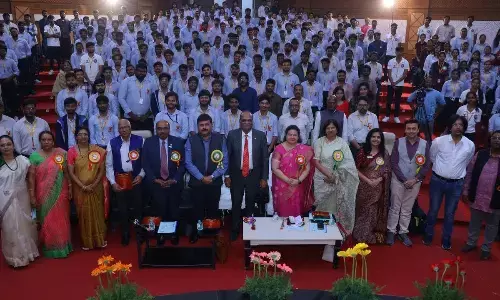Boost export of services, not goods

Representational image
The three sectors of the economy are services, manufacturing and agriculture
The three sectors of the economy are services, manufacturing and agriculture. Presently, services account for about 90 per cent of the GDP of developed countries like United States, manufacturing about 9 per cent and agriculture a meagre 1 per cent.
Our situation is similar with services at about 60 per cent, manufacturing at about 25 per cent and agriculture at about 15 per cent. It is clear that the share of services increases with economic development. Thus, prima facie we should promote the services sector, more so in view of the Corona pandemic.
An article in the journal 'Finance and Development' published by the International Monetary Fund has suggested that countries withdraw from globalisation because economies deeply integrated with the global economy have suffered more during the Corona pandemic. Many could not get raw materials from other countries leading to huge losses. The theory of free trade says that every country should focus on those goods that it can produce the cheapest. Let us say the landed price of Vietnamese coffee in India after adding the cost of transport is less than the cost of production in India. In that case, it would be profitable for India to import coffee from Vietnam rather than produce it domestically. Conversely, let us say the landed price of Indian tea in Vietnam after adding the cost of transport is less than the cost of production of tea in that country. In such a case, it would be profitable for India to import coffee from Vietnam and for Vietnam to import tea from India. Such trade is beneficial for both the countries.
However, the same logic does not apply to raw materials. I was told by a car dealer recently that there is a long waiting list for purchase of cars because the supply of certain imported semiconductor part has been hit because of Corona pandemic. Cars are assembled and are ready to be dispatch but this cannot be done in absence of one small part. Similarly, it is reported that Indian drug companies have suffered lately because the supply of certain raw materials from China has been hit. In view of this, countries are rethinking globalisation because they have to account for costs incurred due to such uncertainties. An insurance premium for the purchase of goods from foreign countries has to be added to protect against such situations. Let us say the landed price of a drug intermediate supplied from China is Rs 1,000 per kg while the cost of production in India is Rs 1,100 per kg. Indian drug manufacturers import the intermediate from China because it is cheaper. However, the manufacturer has suffered due to the interruption of supply from China. He has to insure himself against such interruption. Therefore, he has to add an insurance premium for such interruption just as we add an insurance premium when we buy a car.
Similarly, we must add a risk premium for both imports and exports. Let us say we add an insurance premium of Rs 100 per kg. Now, the drug intermediates imported from China would cost Rs 1,100. This will be equal to the cost of the same intermediate made in India at Rs 1,100 per kg. It would then become profitable to produce the intermediate in India. Countries are implicitly adding this risk premium and withdrawing from globalisation of manufactured goods that have to be transported physically.
The situation with services is different. Another article in the same journal 'Finance and Development' says that there will take place deeper globalisation in the trade of services such as in online tuition, telemedicine, translations, movies, software and the like. The supply of these services through the internet is not likely to be affected by a crisis like the Corona pandemic.
In this background, it is time that we reconsider our strategy of increasing exports of manufactured goods. Many benefits are to be obtained if we develop the exports of services instead. First, as said above, the export of services is less likely to be affected by problems such as Corona pandemic. Second, the services sector employs large numbers of educated workers and pays relatively higher wages. A person providing online tuition in Mathematics can earn up to Rs 1,000 per hour. We have a large force of educated youth who are also English speaking. These youth can get jobs in exports of services. Third, India has a scarcity of natural resources. We have less coal and hydropower and our capacity to produce electricity is limited. We also have limited stocks of raw materials and limited land for agriculture. We have to import a number of metals for our industry and phosphates for the production of fertilisers. We can continue to export these services despite scarcity of these resources. For example, we have to import more phosphates if we export more rice. Our rice production and export will suffer in case phosphates cannot be imported. Such a problem does not arise if we want to export online tuitions.
We must change our approach to education in order to capture the world market in services. The new education policy lays considerable stress on mother and regional languages. That is fine but it should not be pursued at the expense of English, French, Chinese and Japanese. There is a need to focus more on English and other foreign languages. This does not have to come at the cost of our culture.
The people of Indus Valley formed their culture in the Indus language that remains undeciphered till date. They then transmitted their culture to Prakrit language and then to Devanagari language. The languages changed but the culture remain vibrant and continuous. Similarly, our culture can jump Sanskrit, Telugu, Devanagari and other Indian languages into English. That will also help globalise or culture. We must adopt English so that our youth can get jobs in the exports of services without abandoning their own culture.
The main obstruction is our bureaucracy. Manufacturing provides moolah in the purchase of land, grant of no objection certificate for pollution, obtaining electricity connection, and so on. Services do not provide many opportunities for moolah. Further, the education bureaucracy does not want to teach at all. Therefore, our bureaucrats lead the politicians to promote manufacturing that provide moolah and does not require intense teaching.
(The author is former Professor of Economics at IIM, Bengaluru)
(The opinions expressed in this column are those of the writer. The facts and opinions expressed here do not reflect the views of The Hans India)











